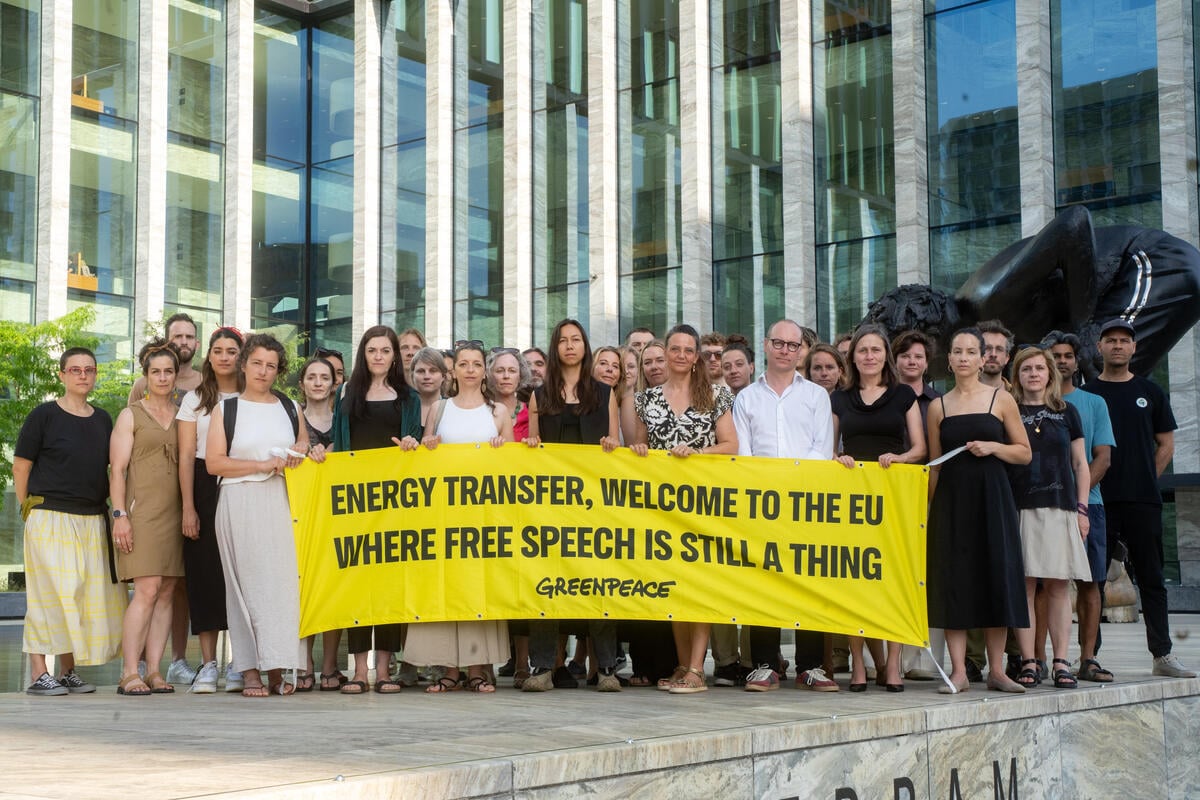On 31 March, 2015, Joni Mitchell – who helped launch Greenpeace with a 1970 benefit concert, and emerged as one of the greatest songwriters and performers of the last 50 years – experienced a brain aneurysm. Friends found her unconscious at her home in Los Angeles. She regained consciousness in the ambulance and entered intensive care at UCLA Medical Center. She was alert and communicating before and after treatment.
“Joni is a strong-willed woman,” her friend Leslie Morris said, “and is nowhere near giving up the fight.” The public may send messages to Mitchell at We Love You, Joni!. Joni is now at home in Los Angeles and undergoing daily therapies. Although her condition is serious, a recovery is expected.
Vulnerable young artist
I first heard Joni Mitchell’s music in the summer of 1969, when Stephen Stills introduced her at the Big Sur Folk Festival in California. A year later, I saw her at the Isle of Wight festival in England, with some 600,000 other music fans drawn by stars of 1960s music: The Doors, The Who, Miles Davis, Jimi Hendrix, Donovan, Joan Baez, and Joni Mitchell.
When Mitchell played, fans outside the fence – who could not afford the £3 (about £30 or €40 today) weekend ticket – had grown restless. They stormed the corrugated iron barriers and broke through, as Mitchell sang her new song “Woodstock … we are stardust, we are golden…”
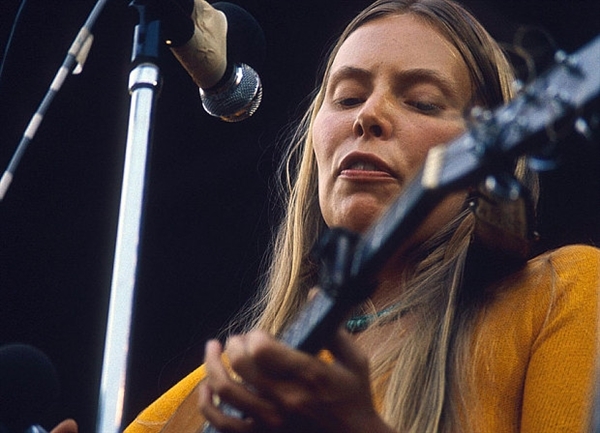
A young man rushed onto the stage shouting that the festival should be free. A visibly shaken Mitchell – 26, and just beginning her career – stopped her performance. “Look, I’ve got feelings, too,” she pleaded in a trembling voice. “It’s very difficult to lay something down before an audience like this. Please be respectful.” The vulnerable young artist broke down into tears and left the stage, but returned to perform her current radio hit, “Big Yellow Taxi,” singing, “You don’t know what you’ve got ’til it’s gone.” She then left the stage, weeping in her manager’s arms. The scene felt heartbreaking.
In 1970, Mitchell headlined the concert in Vancouver, Canada that launched Greenpeace.
Canadian Prairie Girl
Joni Mitchell was born Roberta Joan Anderson, on 7 November, 1943, in Fort Macleod, Alberta, where her Norwegian father instructed young World War II pilots at the Canadian airbase. Her Scots/Irish mother inspired a love for literature, her father urged her to study piano, and she taught herself guitar from a Pete Seeger instructional record.
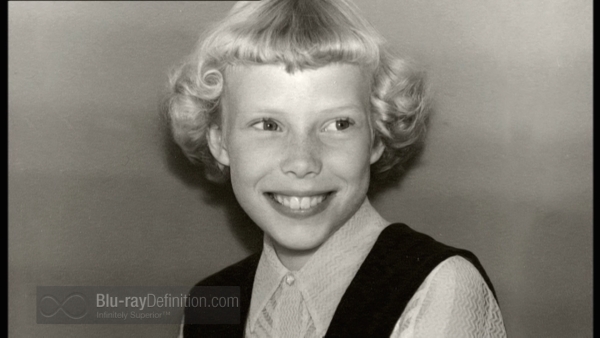 © Blu-rayDefinition.com
© Blu-rayDefinition.comPolio struck her at the age of nine, and in the hospital, she performed songs for other patients. She recovered, but the polio limited her dexterity, and she found normal guitar fingerings difficult. She devised alternative tunings to make complex chords easier to play. By 1961, she was performing in Saskatchewan nightclubs and attending art school. In 1962, Joni played her first paid gig at the Louis Riel folk/jazz club in Saskatoon.
In 1964, at the age of 20, she left home to become a folk singer in Toronto, and wrote her first song, “Day After Day,” on the train ride east. She became a well-loved phenomenon in Toronto clubs, met Michigan folk-singer Chuck Mitchell, married him, and began touring with him in Michigan, at the Rathskeller in Detroit and the The Folk Cellar in Port Huron. She appeared on the CBC folk music show, “Let’s Sing Out.”
By 1967, her marriage had dissolved, and Joni moved to New York City, performing as a solo artist at Cafe Au Go Go, the Gaslight, and other clubs. She learned more sophisticated guitar tunings from American musician Eric Andersen, and other artists began performing and recording Joni’s songs. Tom Rush recorded “Urge For Going,” Buffy Sainte-Marie covered “The Circle Game,” and Judy Collins had a top ten hit with “Both Sides Now.”
Joni Mitchell became known for her wide-ranging contralto voice; her use of modal, chromatic, and pedal tone harmonies; exotic guitar tunings; and extraordinary, lyrical songs. Throughout her career, Mitchell wrote songs in over fifty different guitar tunings that supported her unique harmonies.
As Mitchell’s fame spread, Joan Baez attended her show in New York, and at a Florida club, she met David Crosby, who invited her to Los Angeles and convinced Reprise Records to record her first album, Song to a Seagull, produced by Crosby, with Stephen Stills, playing bass.
A year later, in 1969, she released her second album, Clouds, which earned her first Grammy Award. The collection includes hit songs “Chelsea Morning” and “Both Sides Now,” the haunting chromatic “Songs to Aging Children Come,” and the anti-Vietnam-War anthem “The Fiddle and the Drum.” Later that year, she sang harmony vocals on David Crosby’s first solo album and on James Taylor’s inaugural album, Mud Slide Slim. She would help launch Taylor’s career at the Greenpeace concert.
Stop the bombs
In Vancouver, Canada, in June 1970, the fledgling Greenpeace organization made plans to sail a boat into the US nuclear test zone in the Aleutian Islands. To raise money, co-founder Irving Stowe decided to stage a benefit concert, and wrote a letter to Joan Baez. Although Baez could not attend, she sent a check for $1,000, recommended he call Joni Mitchell and stalwart anti-war activist Phil Ochs, and gave Stowe their phone numbers. Both agreed to perform, and the date was set for 16 October, 1970 at the Vancouver Coliseum.
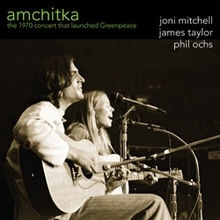
The next day, they visited a record store and discovered that James Taylor had just released his second album, Sweet Baby James, already at the top of the charts, with hit song “Fire and Rain.” The local producer added British Columbia band Chilliwack, with a hit single of their own, “Lydia Purple.” There was no public advance notice of the mystery guest, James Taylor, but tickets sold out quickly.
Phil Ochs, opened the show and spoke directly to the raison d’etre of the evening with his song “I Ain’t Marchin’ Anymore.” Chilliwack got the crowd into a rock-‘n’-roll frenzy. James Taylor stunned the crowd with his cryptic “Carolina On My Mind” and “Fire and Rain.” Joni Mitchell appeared visibly nervous, still uncertain about her headline status, but her popular songs “Chelsea Morning” and “Big Yellow Taxi” brought shrieks of joy from the audience. James Taylor joined her for an encore, singing Bob Dylan’s “Mr. Tambourine Man.” Irving Stowe raising the peace sign and delivered flowers to Mitchell on stage. After expenses, the event netted $17,000. This money, and the attention from the concert, lifted the nascent Greenpeace to a new stature. Attendance at the meetings swelled, and money poured in.
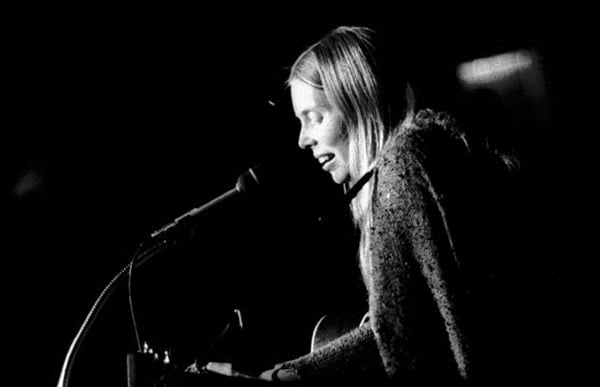 © George Diack, Vancouver Sun
© George Diack, Vancouver Sun
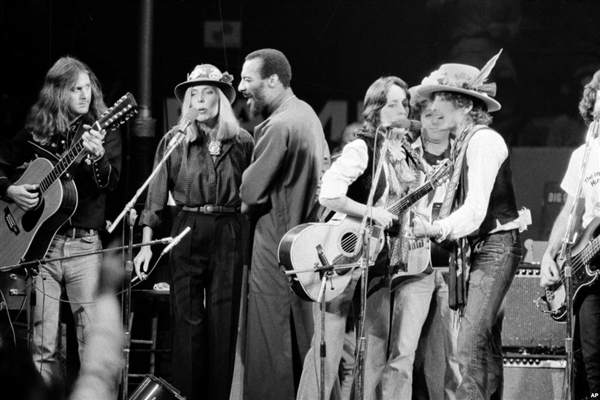 © AP © AP” alt=”Roger McGuinn, Joni Mitchell, Richie Havens, Joan Baez, Bob Dylan. Rolling Thunder tour 1975.
© AP © AP” alt=”Roger McGuinn, Joni Mitchell, Richie Havens, Joan Baez, Bob Dylan. Rolling Thunder tour 1975.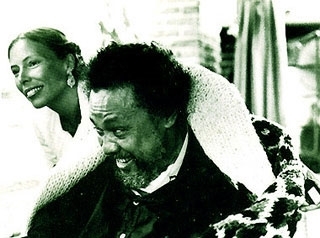 © Sue Mingus
© Sue Mingus


